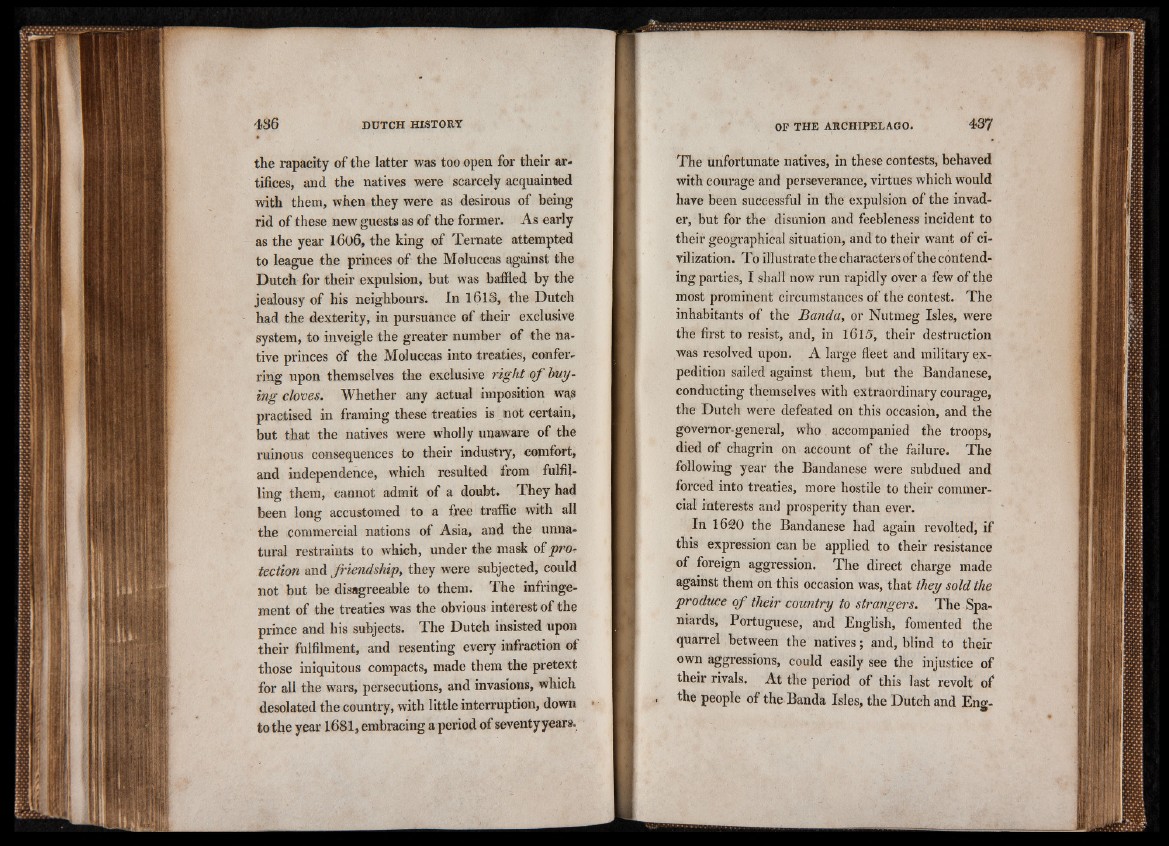
the rapacity of the latter was too open for their artifices,
and the natives were scarcely acquainted
with them, when they were as desirous of being
rid of these new guests as of the former. As early
as the year I606, the king of Ternate attempted
to league the princes of the Moluccas against the
Dutch for their expulsion, but was baffled by the
jealousy of his neighbours. In 1618, the Dutch
had the dexterity, in pursuance of their exclusive
system, to inveigle the greater number of the native
princes oY the Moluccas into treaties, conferring
upon themselves the exclusive right of buying
cloves. Whether any actual imposition was
practised in framing these treaties is not certain,
but that the natives were wholly unaware of the
ruinous consequences to their industry, comfort,
and independence, which resulted from fulfilling
them, cannot admit of a doubt. They had
been long accustomed to a free traffic with all
the commercial nations of Asia, and the unnatural
restraints to which, under the mask of protection
and friendship, they were subjected, could
not but be disagreeable to them. The infringement
of the treaties was the obvious interest of the
prince and his subjects. The Dutch insisted upon
their fulfilment, and resenting every infraction of
those iniquitous compacts, made them the pretext
for all the wars, persecutions, and invasions, which
desolated the country, with little interruption, down
to the year 1681, embracing a period of seventy years.
The unfortunate natives, in these contests, behaved
with courage and perseverance, virtues which would
hare been successful in the expulsion of the invader,
but for the disunion and feebleness incident to
their geographical situation, and to their want of civilization.
To illustrate the characters of the contending
parties, I shall now run rapidly over a few of the
most prominent circumstances of the contest. The
inhabitants of the Banda, or Nutmeg Isles, were
the first to resist, and, in 1615, their destruction
was resol ved upon. A large fleet and military expedition
sailed against them, but the Bandanese,
conducting themselves with extraordinary courage,
the Dutch were defeated on this occasion, and the
governor-general, who accompanied the troops,
died of chagrin on account of the failure. The
following year the Bandanese were subdued and
forced into treaties, more hostile to their commercial
interests and prosperity than ever.
In 1620 the Bandanese had again revolted, if
this expression can be applied to their resistance
of foreign aggression. The direct charge made
against them on this occasion was, that they sold the
produce of their country to strangers. The Spaniards,
Portuguese, and English, fomented the
quarrel between the natives; and, blind to their
own aggressions, could easily see the injustice of
their rivals. At the period of this last revolt of
the people of the Banda Isles, the Dutch and En9e